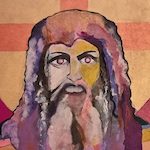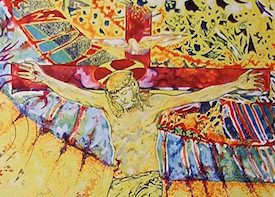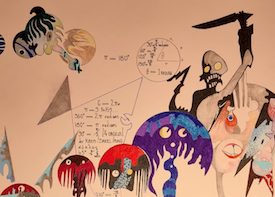God spoke to Jim Overbeck directly – saying:
“I gave you infinities to play with, and an infinity to search for.”
The Autobiography of God Almighty, Vol 1
Theology is, in one sense at least, a study of (and an experience of) the infinite. God is infinite, infinitely powerful, He stands outside of linear time, though He can enter into it at will; He is not subject to the laws of physics, he made them, and can walk on water if he so chooses.
Mathematics also deals with infinities, but at the foundation of mathematics (as in physics) lie contradictions, apparent absurdities, paradoxes. Logic is founded upon mathematics, but mathematics can not deliver the certainties that logic requires.
So – the truth that we are pursuing does not lie in mathematics, but there is a way through mathematics that can lead to deification.
The law of Tertium Exclusi
Tertium Exclusi – the “excluded third” (also called Tertium Non Datur), one of the long-held laws of logic, means, put simply, that something either is or is not; there is no third alternative. For example, the statement “It is raining” (A) has as its opposite the statement “It is not raining” (not-A): there cannot be a third possibility, a middle ground, where it is both raining and not raining at the same time (A and not-A simultaneously).
Jim Overbeck showed that this law, along with earthly identity, is negated when considering the true nature of man: thus to assert one’s identity “I am a man” (B) has as its contrary statement “I am not a man” (not-B). According to worldly logic, B and not-B cannot both be true simultaneously; yet in theosis, with Christ as our example and our gateway to the divine, it is possible for a man also to be a god simultaneously. Thus the apparent fixedness of earthly identity is negated, along with the law of Tertium Exclusi.
Summary of Jim’s achievements in mathematics
- Tertium exclusi does not hold for transfinitudes, nor for finitudes imbedded in them.
- Infinities are prior to finitudes: thus mathematics precedes logic.
- Infinities lead to insolubilia – hence he radicalised ‘arithmetics of the line’ by beginning with insolubilia, viz, he substituted the Fourier-Bolzano series (as stated by B. Bolzano) for the natural numbers and positive integers. This gives contradictory sums at infinity and is thus initially paradoxical.
- Overbeck recognised that the negation of tertium exclusi negated identity, that is, not only for transfinitudes, but also for finitudes. As a lack of identity implies incomplete entities, it is man – not simply his systems – who is incomplete.
- Christ’s visit to Jim Overbeck taught him man is only completed by deification – viz, by the restoration of divine energies and divine identity.
Much of the theory of deification is to be found in Overbeck’s The Autobiography of God Almighty. The mathematical notebooks are added as a means of demonstrating the way through the abysses of mathematics to divinization
Downloads




